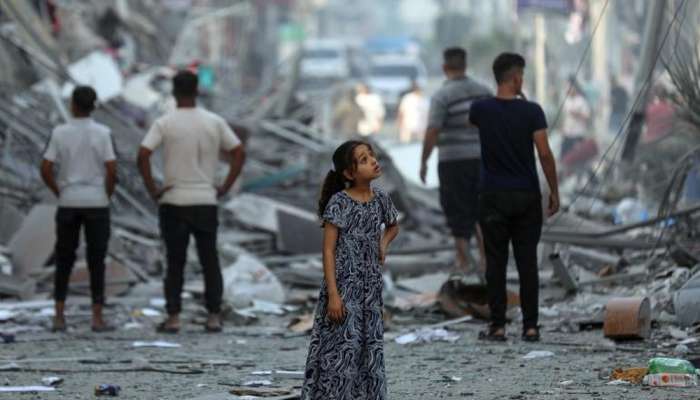
New York: The UN International Children's Emergency Fund (UNICEF) called for an immediate ceasefire and for sustained and unimpeded access for humanitarian assistance into Gaza Strip, saying that child casualties in Gaza is "a growing stain on our collective conscience".
Over the past 18 days, Gaza Strip has borne witness to a devastating toll on its children, with a reported 2,360 fatalities and a reported 5,364 injuries due to unrelenting attacks, or more than 400 children reportedly either killed or injured daily, UNICEF said in a press release.
Almost every child in Gaza Strip has been exposed to deeply distressing events and trauma, marked by widespread destruction, relentless attacks, displacement, and severe shortages of essential necessities such as food, water, and medicine, UNICEF added.
"The killing and maiming of children, abduction of children, attacks on hospitals and schools, and the denial of humanitarian access constitute grave violations of children's rights," said Adele Khodr, UNICEF Regional Director for the Middle East and North Africa.
"UNICEF urgently appeals on all parties to agree to a ceasefire, allow humanitarian access and release all hostages. Even wars have rules. Civilians must be protected children particularly and all efforts must be made to spare them in all circumstances," Khodr stressed.
The West Bank has also witnessed an alarming surge in casualties, with nearly a hundred Palestinians reportedly losing their lives, including 28 children, and at least 160 children reportedly sustaining injuries. Even before the tragic events of 7 October 2023, children in the West Bank were already grappling with the highest levels of conflict-related violence in two decades, resulting in the loss of 41 Palestinian children and six Israeli children's lives so far this year, UNICEF added.
"The situation in the Gaza Strip is a growing stain on our collective conscience. The rate of death and injuries of children simply staggering," said Khodr. "Even more frightening is the fact that unless tensions are eased, and unless humanitarian aid is allowed, including food, water, medical supplies and fuel, the daily death toll will continue to rise." Fuel is of paramount importance for the operation of essential facilities such as hospitals, desalination plants, and water pumping stations. Neonatal intensive care units house over 100 newborns, some of whom are in incubators and rely on mechanical ventilation, making an uninterrupted power supply a matter of life and death, UNICEF stressed.
The entire population of the Gaza Strip, comprising nearly 2.3 million people, is facing a dire and pressing lack of water, which poses grave consequences for children, roughly 50% of the population. The majority of water systems have been severely impacted or rendered non-operational due to a combination of factors, including fuel shortages and damage to vital production, treatment, and distribution infrastructure. Currently, the water production capacity is a mere 5% of its usual daily output, it noted.
To respond to the dire situation for children in Gaza Strip, UNICEF called for an immediate humanitarian ceasefire; all access crossings into Gaza to be opened for a safe, sustained and unimpeded access of humanitarian aid, including water, food, medical supplies, and fuel; urgent medical cases in Gaza to be allowed to leave or to be able to receive critical health services; and respect and protection for civilian infrastructure such as shelters and schools, and health, electric, water and sanitation facilities, to prevent loss of civilian and children lives, outbreaks of diseases, and to provide care to the sick and wounded.